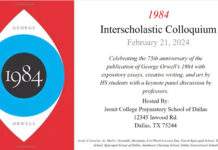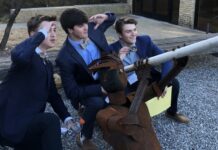The senior class of 2014 is the first ever to experience the new options to the English curriculum where they can choose their own path for second semester Senior English. This year, the Senior English classes will still be labeled English 4; however, for their second semester, seniors will choose from four classes that focus on different types of literature: American Literature Post WWII, Literature of the Southwest, Non-Fiction, and Modern Non-Western Literature.
Ms. Sheryl Row clarifies the significance of the first semester of senior English, explaining “the Fall semester remains consistent for all English 4 students for a number of reasons. We have college materials to handle.” She also confirms that all English 4 classes will learn “narrative non-fiction and argumentative and persuasive writing [as well as] Greek tragedy because well-educated students should know this topic.”
After establishing a strong foundation of English knowledge in that first semester, students will have a range of options to cultivate those skills in a class that matches their interests. Mr. David McGowan, co-chair of the English department and a great advocate of the change said, “It was our hope to make the second semester of Senior English more meaningful to the students.” He and Ms. Row “have been wanting to offer choices for some time now and this year [they] seized the opportunity to do so.” However, if students choose to head down the road of AP English classes, these changes have no effect on the Senior AP Language and Composition, currently taught by Dr. Michael Degen and Mr. Colin Hanley, and Honors English Seminar, taught by Mr. Robert McGhee.
The first option, American Literature Post WWII, presents seniors with the opportunity to analyze literary works from the United States after 1945. The second option, Literature of the Southwest, explores historically significant literature from the Southwest region of the United States. The third, Non-Fiction, focuses on literature such as memoirs and autobiographies, essays, biographies, and speeches that are culturally or historically significant. The last class option is Modern Non-Western Literature, a class that studies contemporary pieces from regions around the world such as Africa, Asia, the Caribbean, and Latin America.
When asked how the sections of English were distributed among English 4 teachers, Mr. McGowan stated, “The senior English instructors were each prepared to teach any of the offered choices.” After reviewing the results of a survey that the seniors completed during their junior year, it was evident that the classes with the most interest were Non-Fiction and American Literature. Therefore, Mr. McGowan and Ms. Row, teachers who have been instructing English 4 classes for many years, both will teach the Non-Fiction and American Literature Post WWII. Mr. Paul McDaniel, junior counselor, will teach the one section of seniors who chose Literature of the Southwest. Mr. Erik Burrell will offer one section of Non-Western Literature.
As the English additions are works in progress and involve brand-new changes in teaching, many of the books on the reading lists have not been finalized. Mr. McGowan is confident that both Non-Fiction courses will read The Junction Boys by Jim Dent, a book that explores the legendary Texas A&M football coach, Paul “Bear” Bryant, and his grueling journey to form a championship team, as well as, A Movable Feast by Ernest Hemingway, a memoir of Hemingway’s life in 1920s Paris. Ms. Row specifies the books in her particular section of American Literature Post WWII explaining, “the focus of the course considers the common man and the choices he makes, good or bad. We use Ben Fountain’s short story collection, Brief Encounters with Che Guevarra, and Khaled Hosseini’s The Kite Runner, in addition to numerous short articles.” However in addition to the required books, each instructor can choose from his or her own preference of books, adding supplemental readings as needed.
These new sections of senior English allow for a wider range of opportunity for seniors to pursue their particular English interests. Mr. McGowan explained that they “hope that seniors chose topics they are interested in and will enjoy learning along with their instructors.” Ms. Row shared that she “had fun developing these courses with David McGowan and [they] believe the students will enjoy them.” While all of these instructors are confident in the success of these new sections of English, Mr. McGowan perfectly states, “New courses require lots of work and some trial and error, [inviting] the class of 2014 on this voyage of discovery with [the English department].”






